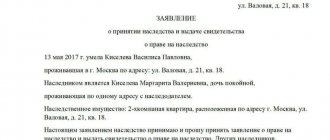State duty for issuing a certificate of inheritance
The amount of the state fee for issuing a certificate of the right to inheritance is established by Art. 333.24 of the Tax Code of the Russian Federation and amounts to:
- children, including adopted children, spouse, parents, full brothers and sisters of the testator - 0.3% of the value of the inherited property, but not more than one hundred thousand rubles;
- other heirs - 0.6% of the value of the inherited property, but not more than one million rubles.
The value of the property is determined by cadastral documents or by an appraisal agreement.
State duty upon entering into inheritance in 2021
Acceptance of part of the inheritance and acceptance of the share
Accepting part of the inheritance means giving consent to the heir to accept the inheritance that is due to him, regardless of location, this also includes property discovered after the inheritance was accepted.
A share of the inheritance is accepted in cases where there is no will.
Property is divided equally after the fact of inheritance is established, the consent of the heirs is not taken into account.
The obligatory part must be given to minor or disabled children of the deceased, a spouse with a disability, parents and other people who are supported by the testator at the time of death, regardless of the consent of other heirs. It is impossible to set conditions for consent to accept an inheritance, that is, it is impossible to accept an inheritance under a condition or with reservations. Perhaps accepting the inheritance and refusing the inheritance, that is, it is necessary to agree to accept, as there is, or refuse at all.
The period for refusal of inheritance is also 6 months from the date of opening of the inheritance. It is quite difficult to restore the term when refusing an inheritance. It is necessary to prove valid reasons why the deadline was missed.
It is almost impossible to restore your rights to receive an inheritance if you refuse. Only by proving that the refusal was not of one’s own free will or was signed in a state of insanity is it possible to restore rights.
Which notary should I contact to register an inheritance?
The legislation strictly regulates which notary to contact to register an inheritance. To register an inheritance, you should contact a notary at the address of the testator’s last place of residence. The notary accepts the application from the heir, opens inheritance proceedings, explains to the heir his rights, obligations and consequences of accepting the property.
The application for acceptance of inheritance is written in free form with the obligatory indication of the following information:
- Full name of the deceased;
- address of the testator's last residence;
- Full name of the actual heir;
- data from a document confirming the relationship between the testator and the heir;
- detailed description of inheritance objects (name, location address, characteristics);
- indicate the basis for accepting the inheritance - actual ownership;
- report actions indicating the actual acceptance of property;
- date and signature of the application.
Application form for acceptance of inheritance
| Application for acceptance of inheritance and issuance of a certificate of inheritance |
Lawyer's answers to frequently asked questions
For three years they were registered and lived together with the deceased in the same apartment. How to inherit an apartment?
If there are no other applicants for the apartment, you need to prepare documents confirming the fact of cohabitation and evidence of your actions indicating your desire to get an apartment. You contact the notary with the collected documents and with an application for acceptance of the inheritance and issuance of a certificate of right to inheritance.
I cannot document my actions aimed at actually accepting the inheritance. There are only witnesses. Is it possible to claim an inheritance in my case?
In the absence of claims from third parties to the property, one can hope to receive an inheritance. Each case of actual acceptance of inheritance is individual. Leave your request in the feedback form or to the consultant on duty. Our lawyers will contact you, ask clarifying questions and advise you on what to do correctly in your case.
We lived with the deceased for 10 years, but I was not registered in his house. After my death, I continue to live in this house, pay taxes, utilities, repaired the bathhouse, changed all the electrics in the house. Can I claim an inheritance if I have a conflict with the deceased’s daughter regarding the house?
If you do not reach an agreement with the testator’s daughter, go to court with a statement of claim in which you can specify two demands at once - confirmation of the actual receipt of the property and recognition of the right to receive a share in the property.
Inheritance by law
The transfer of inheritance (inheritance) by law provides for the transfer of property to the heirs according to priority (clause 2 of Article 1111 of the Civil Code of the Russian Federation, hereinafter referred to as the Civil Code of the Russian Federation). This procedure is applicable only in the case where there was no will of the testator or it was successfully appealed in part or in full by one of the heirs, or the heirs under the will refused to inherit, or the heir under the will died before accepting the inheritance or was declared unworthy.
The Civil Code of the Russian Federation establishes a division into eight lines of inheritance (seven lines and inheritance by right of representation). The first stage includes children, spouse (husband or wife) and parents of the testator (Part 1 of Article 1142 of the Civil Code), the second - brothers and sisters, as well as grandparents on any of the lines (Part 1 of Article 1143 of the Civil Code) , to the third - brothers and sisters of the testator's parents (uncles and aunts) (clause 1 of Article 1144 of the Civil Code).
Subsequent queues are determined by the degree of relationship, that is, the number of births separating relatives from each other. For example, the fourth degree of the third degree of kinship is great-grandfathers and great-grandmothers, the fifth degree of the fourth stage is the children of one’s own nephews and nieces, etc. (Article 1145 of the Civil Code)






